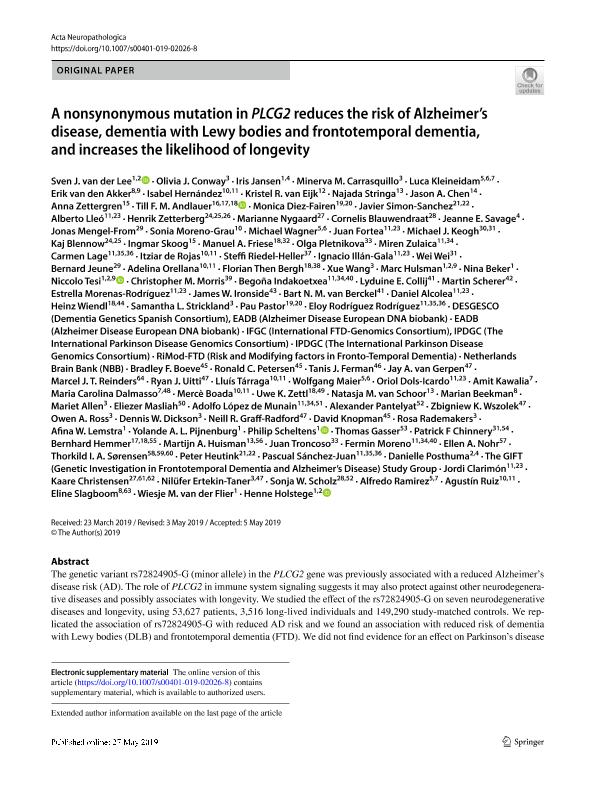Artículo
A nonsynonymous mutation in PLCG2 reduces the risk of Alzheimer’s disease, dementia with Lewy bodies and frontotemporal dementia, and increases the likelihood of longevity
van der Lee, Sven J.; Conway, Olivia J.; Jansen, Iris; Carrasquillo, Minerva M.; Kleineidam, Luca; van den Akker, Erik; Hernández, Isabel; van Eijk, Kristel R.; Stringa, Najada; Chen, Jason A.; Zettergren, Anna; Andlauer, Till F. M.; Diez Fairen, Monica; Simon Sanchez, Javier; Lleó, Alberto; Zetterberg, Henrik; Nygaard, Marianne; Blauwendraat, Cornelis; Savage, Jeanne E.; Mengel From, Jonas; Moreno Grau, Sonia; Wagner, Michael; Fortea, Juan; Keogh, Michael J.; Blennow, Kaj; Skoog, Ingmar; Friese, Manuel A.; Pletnikova, Olga; Zulaica, Miren; Dalmasso, Maria Carolina

Fecha de publicación:
26/05/2019
Editorial:
Springer
Revista:
Acta Neuropathologica
ISSN:
0001-6322
e-ISSN:
1432-0533
Idioma:
Inglés
Tipo de recurso:
Artículo publicado
Clasificación temática:
Resumen
The genetic variant rs72824905-G (minor allele) in the PLCG2 gene was previously associated with a reduced Alzheimer’s disease risk (AD). The role of PLCG2 in immune system signaling suggests it may also protect against other neurodegenerative diseases and possibly associates with longevity. We studied the effect of the rs72824905-G on seven neurodegenerative diseases and longevity, using 53,627 patients, 3,516 long-lived individuals and 149,290 study-matched controls. We replicated the association of rs72824905-G with reduced AD risk and we found an association with reduced risk of dementia with Lewy bodies (DLB) and frontotemporal dementia (FTD). We did not find evidence for an effect on Parkinson’s disease (PD), amyotrophic lateral sclerosis (ALS) and multiple sclerosis (MS) risks, despite adequate sample sizes. Conversely, the rs72824905-G allele was associated with increased likelihood of longevity. By-proxy analyses in the UK Biobank supported the associations with both dementia and longevity. Concluding, rs72824905-G has a protective effect against multiple neurodegenerative diseases indicating shared aspects of disease etiology. Our findings merit studying the PLCγ2 pathway as drug-target.
Archivos asociados
Licencia
Identificadores
Colecciones
Articulos(CCT - PATAGONIA CONFLUENCIA)
Articulos de CTRO.CIENTIFICO TECNOL.CONICET - PATAGONIA CONFLUENCIA
Articulos de CTRO.CIENTIFICO TECNOL.CONICET - PATAGONIA CONFLUENCIA
Citación
van der Lee, Sven J.; Conway, Olivia J.; Jansen, Iris; Carrasquillo, Minerva M.; Kleineidam, Luca; et al.; A nonsynonymous mutation in PLCG2 reduces the risk of Alzheimer’s disease, dementia with Lewy bodies and frontotemporal dementia, and increases the likelihood of longevity; Springer; Acta Neuropathologica; 138; 2; 26-5-2019; 237-250
Compartir
Altmétricas



